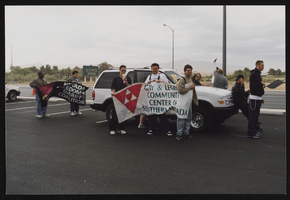Search the Special Collections and Archives Portal
Search Results
Kelly Echeverria (Washoe County) oral history interview conducted by Kelliann Beavers, 2022 September 22
Level of Description
Archival Collection
Collection Name: Lincy Institute "Perspectives from the COVID-19 Pandemic" Oral History Project
Box/Folder: Digital File 00
Archival Component
Monroe Williams oral history interview
Identifier
Abstract
Oral history interview with Monroe Williams conducted by Claytee D. White on August 15, 2000 and August 22, 2000 for the Boyer Early Las Vegas Oral History Project. In this interview Monroe Williams discusses moving to Las Vegas, Nevada in 1943, living in the historical Westside neighborhood, and being one of the first black fire fighters in Las Vegas. He also talks about being involved with the National Association for the Advancement of Colored Peoples (NAACP), being in the Navy for two years, and his real estate and property management companies.
Archival Collection

Gay and Lesbian Community Center of Southern Nevada and the Nevada Freedom to Marry Coalition at the second annual Gay Pride parade: photographic print
Date
Archival Collection
Description
Image
Archives and libraries
Level of Description
Archival Collection
Collection Name: Dennis McBride Collection on LGBTQ Las Vegas, Nevada
Box/Folder: N/A
Archival Component
Esther Langston oral history interview
Identifier
Abstract
Oral history interview with Esther Langston conducted by Claytee D. White on February 22, 2005 for the UNLV @ 50 Oral History Project. In this interview, Langston provides an overview of her early life and career in social work. She describes how the women in her family are positive and empowering role models. Langston moves on to explain how she become a social worker over a period of many years. She states that a job experience that helped her gain the qualifications of a social worker was working as an office manager at the Nevada Test Site. She also mentions how she has had to work with conflicts such as racial inequalities.
Archival Collection
Wendy M. Starkweather oral history interview
Identifier
Abstract
Oral history interview with Wendy Starkweather conducted by Claytee White on June 16, 2010 and June 22, 2010 for the Boyer Early Las Vegas Oral History Project. Starkweather discusses moving to Las Vegas, Nevada in 1978 when her husband Peter L. Starkweather accepted a teaching position in the biology department at the University of Nevada, Las Vegas (UNLV). She also discusses working in several types of libraries in Las Vegas before being offered the head of reference position at the UNLV library in 1985. She talks about her experiences working under six deans and retiring in 2010.
Archival Collection
Aaron Williams oral history interview
Identifier
Abstract
Oral history interview with Aaron Williams conducted by Claytee D. White on August 16, 2005 for the Boyer Early Las Vegas Oral History Project. Williams recalls individuals he worked with, such as Woodrow Wilson, Jimmy Gay, and the mayor of Los Angeles, California. He remembers the Westside Federal Credit Union, joining the National Association for the Advancement of Colored People (NAACP), and encountering discrimination at one of the first jobs he had at the Sahara Hotel. He shares anecdotes of Robert Maheu, Steve Wynn, Lubertha Johnson, Ruby Duncan, Mabel Hoggard, and other Las Vegas, Nevada notables.
Archival Collection
Mark Brandenburg oral history interview
Identifier
Abstract
Oral history interview with Mark Brandenburg conducted by Claytee D. White and Stefani Evans on September 22, 2017 for the Building Las Vegas Oral History Project. In this interview, Brandenburg discusses his upbringing in Las Vegas, Nevada. He talks about his stepfather’s involvement with the opening of the Golden Gate Hotel and Casino, becoming a co-owner of the property in 1990, and joining other downtown properties to form the Fremont Street Experience. Brandenburg describes the challenges in competing with mega-resorts on the Strip, modernizing the Golden Gate Hotel and Casino, and weaving the history of the Golden Gate Hotel and Casino with that of the more recent Fremont Street Experience. Lastly, Brandenburg discusses the monetization of the street, and the future of the Fremont Street Experience.
Archival Collection
Archived websites
Level of Description
Archival Collection
Collection Name: UNLV December 6, 2023 Memorial Collection
Box/Folder: N/A
Archival Component
Lucile Nyberg oral history interview
Identifier
Abstract
Oral history interview with Lucile Nyberg conducted by Alison Hartough on February 22, 1978 for the Ralph Roske Oral History Project on Early Las Vegas. In this interview, Nyberg discusses the history of Overton, Nevada and life in the town. Nyberg describes early Las Vegas, Nevada and life in Boulder City, Nevada. Nyberg goes on to discuss her career as a teacher and the changes made to education in Las Vegas. Nyberg also discusses the development and the economy of Las Vegas, and briefly discusses prostitution in the city. Nyberg's husband, Richard Nyberg, is present during the interview, but does not speak.
Archival Collection
